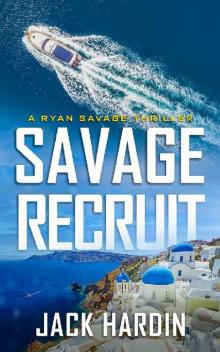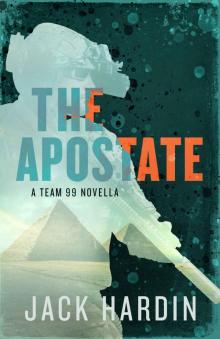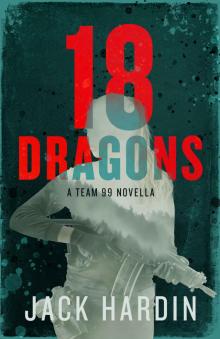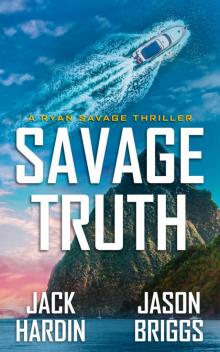- Home
- Jack Hardin
Vacant Shore Page 6
Vacant Shore Read online
Page 6
“Where did you get these, boy?” he bellowed.
“I took them myself, sir.”
To that, the confounded governor gave a pause that was longer than his belt. “And what are you planning on doing with these? Are these the only copies?”
“What do you think, sir?”
“Son,”—the color in the governor’s face started to resemble that of a Red Delicious apple—“I’m not sure you understand the gravity of what you’ve just done. This is most inappropriate.”
Reardon nodded. “I totally agree, sir. One hundred percent. I wonder just how inappropriate your wife will think they are. Or your constituents.”
The governor stood, jammed a plump finger toward his intern. “Now I want you to leave and just forget all about this nonsense. You’re in way above your head, young man. And you are fired too. I don’t ever want to see your face again.”
“No.”
“I’m sorry?”
“I said, no. Get your ears checked, Governor. I’m not leaving. In fact, if you want to continue working behind this desk then you are going to do a few things for me.”
Snap—Snap—Snap—Snap. And that was how Scott Reardon got his career.
The years followed, and he worked strategically up the political ladder, doing so with a rare kind of finesse. He added value wherever he went, often with great commitment and energy, even helping to advance the political ambitions of those he had dirt on. Including the likes of Governor Musgrove. Reardon interned again in Indianapolis the next summer, and even though the zipper-happy governor held no future benefit for Reardon (he had already spent the last year making the necessary connections in D.C.), Reardon made sure to lead a charge among young professionals for Musgrove’s re-election. It was an irony that the men that Reardon put under his thumb ended up very much liking him, even if they were a little nervous about it. Getting behind their cause, whatever it was, made them feel that Reardon was, somehow, on their side.
The first decade he had never asked for money. Never. Not once. Didn’t matter who it was. Early on he had only asked for heartfelt introductions. Politics was about who you knew and what they thought of you. At twenty-two, if Scott Reardon had known only one thing, it was that. But eventually he came to see how many men in power had spines made of jelly, and he began to utilize his knowledge of their lesser morality to accumulate more power, pushing through deals that ended with Reardon making a great deal of money. The kind of money the IRS knew nothing about. The kind of money that smeared invisible blood across your palms.
Reardon stood, stepped over to his window, and looked out. The James V. Forrestal Building, home to the U.S. Department of Energy, sat along Independence Avenue, and from his window on the fourth floor of the North Building, Reardon could see the Smithsonian Institution and the National Mall beyond. At least “We the People” were easily distracted. One day's political gossip was quickly forgotten by the next day’s tragedy. Still, he didn’t like the temporary attention or the internal audits this information would bring. Attention often meant nosy people started poking around corners they previously didn’t even know were there. It meant that the wrong people started asking the right questions.
It wasn’t the leak that he was concerned about; it was who did the leaking—who had been following him, and why. Reardon went back to his desk and opened the middle drawer, reached in the back, and brought out an old cell phone manufactured fifteen years ago. He flipped back the cover and dialed. It was answered on the third ring.
“Tomorrow night,” Reardon said. “Ten o’clock under the oaks.” The line went dead, and, as he slipped the phone into the inside pocket of his suit jacket, his desk phone beeped and his secretary's voice came through. “Sir, I’ve got a Rita Simmons from Russia Today on line three. She said she was curious to know if you received the same information she did?”
Reardon’s heart stopped. He sighed. “Put her through.” He sat back into his chair. Out of an unconscious habit, he adjusted his tie before snatching up the receiver. “Scott Reardon.”
The lady at the other end introduced herself and then, “I want you to know that I am in possession of information that seems to have you working—how might you say it?—deals under the table.”
“Is there a question, Miss Simmons?”
“I would like to extend an invitation for us to meet tonight and offer you a chance to explain before we take this to the air.”
“I have no comment, Miss Simmons. Do what you will. I would, however, encourage you to ensure that you have your facts straight first. You of all people will know that you cannot have facts without context. Get the context wrong and your facts will be also.” Then he hung up. He would not meet with Rita. Doing so would, by its very action, indicate that he had something to defend, that the information she had been provided somehow needed to be cleared up, or that it even mattered enough for him to want to clear it up. No, she could run with her little story.
He would get out of this. It was only a hiccup. Still, he didn’t like hiccups, especially when they were about to be broadcasted on a major news network. He would make a few calls, and no one important would pursue it. The whole thing would fizzle out like a forgotten can of soda. And yet, it wasn’t going to run its course without his reputation taking a hit, and that was what really nagged at him. Public was never a good thing; not in his line of work, not where appearances were the most valuable of currencies.
Whoever had sent the packets had been smart, strategic; they knew just who could invoke the most damage. Had it been given to a major American network like Fox or NBC, Reardon would have had to make one brief phone call and it would have never made it on the air. It wouldn’t have even been filed at the bottom of some dusty drawer. It would have just disappeared. Justin Bieber, eight alarm apartment fires, bi-partisan politics, and live births of baby giraffes would continue to feed America’s incessant need for entertainment.
A knock at his office door.
“Come.”
Titus Clark stepped into the room. Clark, a former Army lieutenant, had functioned as Reardon’s personal assistant for the last eight years. He shut the door and walked across the polished wood floors.
“Sir, I know you’re dealing with this new situation, but I have some more bad news.”
Reardon waved him on.
After they received the envelope earlier that day, Clark had spent nearly an hour searching his boss’s office for bugs or wires. He found nothing. Even so, he lowered his voice. “The...research team that you sent to Arizona. They didn’t make it.”
“They were scheduled to be out there two nights ago. Why am I just now hearing that they didn’t arrive?”
“No, sir. I don’t mean they didn’t get there. I mean they didn’t make it. They’re dead.”
Scott Reardon was not a man to outwardly react. He had, long ago, made a habit of living behind an emotional shroud. But at this news an eye flinched and the edges of his nostrils rimmed white as they flared. His voice was steady, but behind his tie his heart had quickened. “Dead? Explain.”
After sharing the facts as he understood them, Clark said, “The man who killed Miss Cornish…” He trailed off.
“Out with it.”
“Sir, it was Number Four on the list. It was Virgil.”
Reardon’s eyes moved into slits. “How is that possible?”
“We don’t know. Intelligence less than two weeks old had him in Panama.”
“And where is he now?” Reardon asked.
“From what we’ve been able to dig up, Miss Cornish wounded him and also took out the driver of his getaway. Some old man living in a cabin in the woods. The truck flipped. It’s unclear at the moment who found Number Four. He was stabilized in Flagstaff yesterday morning and then flown out to Banner Hospital in Phoenix. That’s where he is now.”
Reardon slowly ran an open hand across his mouth. Finally, with his typical decisiveness, he said, “Move him up on the list. Get someone over to that hos
pital. Now.”
“Yes, sir. Should I green light anyone specific?”
Reardon steepled his fingers beneath his chin and looked through, not at, his assistant. He nodded. “Yes. Yes, you should.”
Chapter Twelve
Ellie stepped out from the cover of the dry dock building and walked across the wooden deck toward the bar. Her bright blonde hair shone in the September sun, and her sandals slapped quietly against her heels. Quinton Davis was still on a barstool, talking with Fu and Gloria, and Major was behind the counter replenishing the garnish tray with cherries, limes, and pineapples. A dish towel was draped across a shoulder. The bar’s tiki roof had been repaired, now made up of old and new palm fronds that made it look like the hut had received skin grafts.
When Ellie moved back to St. James City and bought her house on Lime Avenue, it had been Quinton who had come over and helped repair the motor on her boat lift. It was an unchangeable law of the universe that things started to fall apart as soon you purchased a home. Things that inspections showed to be sturdy and sound started to snap, burn out, or dislodge the moment your pen finished riding across that small mountain of paperwork. Quinton and Major had become friends as Ellie went into high school, but she hadn’t gotten to know Quinton very well before she went off to college. She knew that his daughter had died many years back and that Major had taken it very hard. Several months ago, Quinton had left on a trip to fulfill a promise he’d made to his daughter before she passed. That was all Major had offered up when she asked him about it, and Ellie felt like she would be guilty of emotional trespassing to inquire any further.
Ellie stepped in behind the bar, grabbed a glass, and filled it with water. “Hey, kiddo,” Major said.
“Hey,” she said. “Good having your friend back?”
He pressed the lid back onto the garnish container and started rinsing his hands. “Yes,” he said quietly. “I’m glad, for his sake, it’s behind him.”
Gloria’s strong, bird-like nose dipped into her glass as she took a long sip of her piña colada. She motioned toward Ellie as she swallowed. “Oh, Ellie, Quinton was just telling us all about his trip to all the baseball stadiums.” She poked her husband in the shoulder. “Fu, we should go visit sometime.”
Fu started to give his customary nod of agreement when he resettled himself on his barstool and a clatter ensued, followed by a thunk, and then a dissonant thump. Fu’s eyes widened and suddenly it looked like his face was dealing with a hard case of sunburn. Everyone followed his gaze down toward his feet. Or foot, rather. Fu’s prosthetic leg now lay on the deck, having made a successful retreat from his body.
“Oh,” Gloria said. She started to get up, but Quinton stopped her.
He stood up, bent down, and retrieved the leg. He set it on the bartop and looked at Fu. He rested a hand on his shoulder. “Sorry Fu, I know it’s hard to walk away from something like this.”
The bar broke up and Gloria looked at her husband. “I keep telling you to get fitted for another one.” Fu nodded timidly and drained the last of his rum.
“We love you, Fu,” Ellie smiled, and Fu’s embarrassment seemed to wane.
Quinton returned to his stool, leaving the leg on the bartop where it sat like an irreverent table decoration. “Ellie,” he said, “I hear you’ve been quite busy since I’ve been gone.”
Before she could answer, Gloria said, “Oh, she has. Ellie helped take down all these drug dealers. It was even in the paper. Well, not her name, of course, but the people she took down. She’s a local hero if you ask me.” Gloria beamed like a proud aunt.
Quinton’s gaze drifted over to Major who briefly met it and then returned to wiping down the back counter.
“It’s a good feeling.” Wanting to get such attention off herself, she said, “Quinton, I walked over to the bait shop a couple times while you were gone. Abel seemed to be doing a great job holding things down for you.”
“I’m lucky to have him. I couldn’t have been gone as long as I was without him.”
“I hope your trip was healing,” Ellie said.
Quinton looked at his beer and used his thumb to wipe a bead of sweat from the bottle. He ran his tongue across the front of his teeth. “Thank you, Ellie. It was. In ways I hadn’t expected.” He swiped at the bottle again. “You know, she would have been twenty-one this year. Could have sat here and enjoyed one of these with me.” His head shone in the early afternoon sun like an over-polished bowling ball, browning sunspots scattered across his scalp. He pulled out of it and smiled, stood up. “I’m sure I’ve got work to do.” The prosthetic limb still sat atop the bar. Quinton patted it and said, “It’s time we broke up. Don’t try to follow me.” Everyone chuckled as he said goodbye, and Fu stared thoughtfully at his leg.
Ellie motioned toward the ceiling. “Major, we need to get some Christmas lights back in here. I hate to say it, but I think some poor fisherman is going to pull up the previous strings from the bottom of the Sound.”
Major folded his arms and looked up. “Agreed. I’ll tell you what. I’ll get some today and you can hang them tomorrow.” He winked at her. She always felt safe when he did that. Like she wouldn't want to be anywhere else.
Chapter Thirteen
A three-car collision on Veterans Parkway had Ellie in a short line of stand-still traffic for nearly twenty minutes, putting her at the warehouse as many minutes behind schedule. She parked her truck at a nearby bowling alley and negotiated the cracked and potholed side streets to the warehouse, entering the grounds through a cluster of photinia. Frustration crept through her when she counted over fifteen people already in line. She walked across the dirt lot and fell in line, bringing up the rear. She recognized a few people from the night before, all wearing the same worn clothing. Ellie wore cutoff jean shorts, a white tank top over a black bra, and worn, burgundy Doc Martens that laced up past her ankles. An hour ago she’d spent time in front of the mirror touseling her hair, overusing product, and rough-drying it, giving it a messy, unwashed look.
The evening was breezeless, dark, and quiet, the humidity bathing the night in a thick, unseen cloud of moisture that was drugging the night into sluggishness. Even the cicadas seemed tired, and the frogs and peepers had gone quiet.
The minutes ticked away, and more people fell in behind her, starting with a girl that Ellie took for no older than eighteen. Her face was thin, her blonde hair twisted into thick dreadlocks, some held together by thin silver clamps. Her eyes were tired, dark circles beneath them. She looked sad. Ellie caught her eye but said nothing and looked away. It was still ten minutes before the door was scheduled to open and more people came out of the shadows and extended the line. Ellie noted how quiet everyone was. There was no light banter, no conversation. Just a cough here and there, and a couple people mumbling to themselves.
It wasn’t long before snickering broke out behind her, followed by the girl in dreadlocks telling someone to knock it off. Then the girl pressed hard up into Ellie, forcing her to take a step forward into the woman in front of her. Ellie found her footing and turned around. Three young men, two white, one black, all matching in black jeans and durags were laughing. The shortest one, a heavy white man with a tattoo of praying hands on his neck, was poking at the girl in dreadlocks, laughing and making sexually charged comments. Behind him, his friends were still snickering. They were the same guys that had sent the man in crutches to the ground the night before.
The girl’s gaze was on her feet as she tried to ignore them. Her eyes said she was scared.
Ellie stepped out of the line. She calmly addressed the instigator. “Hi. Would you mind leaving this young lady alone? Please.”
The girl’s head lifted.
The shorter man snarled. “Get outta here. We ain’t done nothing.”
“Can you just keep your hands to yourself? And your comments. That’s all I’m asking.”
He sized her up, his top lip curling. “I’ve never seen you before. And I know I would have remembered
your pretty face.”
Ellie ignored him and returned to her spot in the line, just as the door swung open. The same man from last night—stocky with a thick goatee—stepped to the side. “Just your name,” he called out, and looked back to his clipboard. The strong man from last night was different, but his muscle still spoke over his silence. He surveyed the line indifferently and then took a step to the side until he was positioned against the doorframe. Ellie went up the steps and gave her name as Heather Smith. She listened as the girl gave hers: Abby Norton, and she was the last one allowed in. The men with durags didn’t make the cut. Ellie walked through the door and stepped off to the side as she had been directed. They were in a break room of sorts. A refrigerator was buzzing quietly in the corner. Old brown cabinets lined a wall, and a small table sat in the center of the room.
They allowed in fourteen people, one more than the night before. The two men came back in, and after the door was shut and locked they broke everyone into two groups of seven. The man with the goatee asked the first timers to raise their hands. Ellie’s hand went up along with two others. The man gave the room the rundown in a tired, monotonous voice, like he had given the same speech a thousand times. He probably had.
The shift, he said, ended at 4 AM. A short break was allowed between one and two, and bathrooms were on the other side of the wall. No smoking inside. When the shift was over they would be escorted back here, paid, and sent on their way. And with that, the man led the way out of the break room and into the warehouse. They walked down an aisle of steel racks loaded with nondescript boxes before turning out into a main aisle and passing up large sorting machines and roller racks that extended out fifty feet. Beneath the rollers, strewn across the floor, were tiny paper cutouts the size of a dime. The man stopped and motioned toward Ellie’s group. “Tonight you’ll start with sweeping up. Brooms and bags are against that wall over there. When you’re done with that, there are loose boxes on row twenty-three that need to be stacked and set over by the cardboard compressor. Someone will be by to check on you later. Just one minute.” The man walked over to the concrete tilt wall where a laminated chart was stuck to the wall. He grabbed a black marker that was hanging from a string, removed the cap, and jotted a note on the chart.

 Savage Recruit (Ryan Savage Thriller Series Book 8)
Savage Recruit (Ryan Savage Thriller Series Book 8) Bitter Tide
Bitter Tide Vacant Shore
Vacant Shore Breakwater
Breakwater The Apostate
The Apostate 18 Dragons
18 Dragons Lonely Coast
Lonely Coast Savage Truth
Savage Truth Broken Stern_An Ellie O'Conner Novel
Broken Stern_An Ellie O'Conner Novel Broken Stern: An Ellie O'Conner Novel (Pine Island Coast Florida Suspense Series) Book 1
Broken Stern: An Ellie O'Conner Novel (Pine Island Coast Florida Suspense Series) Book 1